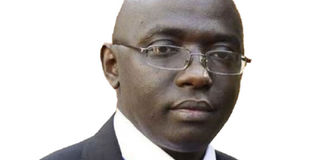Challenge facing Uganda is the slow pace of executing business decisions

Every year, the world awaits a report on the Ease of Doing Business from the World Bank, a ranking index of countries on how best they make registering, starting and doing business. This ranking is an important indicator for prospective investors to use in deciding where to put their money. When the report comes out, countries go in the overdrive to do analysis about why and how they did not perform as well as they expected.
Over the years, Uganda’s performance has been mixed and not impressive enough - averaging 120th out of 190 countries analysed between since 2008. In Uganda, improving the climate for doing business and investment has long been a priority of government, although the rankings have not improved as fast as the authorities and investors would have wished.
In an effort to change this perennial problem of poor ratings and the attendant poor investment climate, President Museveni, in 2004, established the Presidential Investors Roundtable (PIRT), a high level forum that brings private sector players together with government officials - political and technical - to critically identify the bottlenecks to investments and find practical solutions.
Since 2004, the PIRT has focussed on a set of areas and met numerous times to ensure investment-impeding problems resolved. Since 2013, the critical themes or sectors have been identified to address the bottlenecks.
Once a year, the entire team meets at State House Entebbe for two days under the chairmanship of the President to take stock of the progress made. This year, in the course of the two years, before the meeting at State House last week, many other meetings of traders, businessmen, manufacturers, government officials and investors met severally under the leadership of Prime Minister Ruhakana Rugunda to sort out issues and prepare for the meeting at State House.
The Office of the Prime Minister is mandated to coordinate the roundtable. So last Wednesday and Thursday, the PIRT team met at State House Entebbe to conclude the fifth phase. The President was impatient with sectors and technocrats who have not addressed the concerns of investors. For instance, a commissioner from ministry of Trade almost sweated plasma when he was asked to explain why there were delays in providing licences.
A commissioner from ministry of Energy was quizzed for delaying to sort out issuing of the gold refinery at Entebbe. The 5th session of the Roundtable focussed on tourism, competitiveness and Ease of Doing Business, Oil, Gas and Energy, and Mineral Development.
Dr Rugunda first gave a summary of what has been achieved under each of the areas, as well as the outstanding issues. Under Competitiveness and Ease of Doing Business, Dr Rugunda said the World Bank ranking for Ease of Doing Business improved from 122 in 2015 to 115 in 2017, out of the 190 countries that were analysed.
This was a modest improvement of seven places, still an unacceptable level by all standards. Dr Rugunda, however, explained that under the category of the Ease of Starting a Business, Uganda stood at a miserable 165th out of 190 countries - a situation that must be worked on.
As a solution, the full operationalisation and automation of the One- Stop-Centre at the Uganda Investment Authority, should be able to make the process of starting businesses simpler and faster. The meeting heard that long procedures and bureaucratic processes undermine Uganda’s competitiveness.
As an example, it was noted that it requires 18 procedures, takes 122 days and costs nine per cent of the construction structure, to obtain a construction permit. It was also pointed out that getting electricity connected to a business premise requires six procedures and takes 66 days. These figures riled the President, who wondered why the delays and procedures cannot be reduced or eliminated altogether. He directed the responsible agencies to make sure that these must be fixed without delay.
While discussing the tourism cluster, the head of the working group, Amos Wekesa, welcomed positive developments in the sector such as reduction of the tourist visa from $100 to $50, the increase of counters at the Entebbe Airport arrivals from 14 to 20 to reduce the long lines that have often annoyed travellers, and the introduction of electronic visa application system, which has eased the process of acquiring visas by tourists.
Reinforcing Wekesa’s point, Premier Rugunda told the Roundtable that the process of reviving of the National Airline carrier, Uganda Airlines, was already in advanced stages, with a steering committee already in place and expected to present a business and implementation plan by the end of this month.
The value of the international public relations firms that were hired two years ago to market Uganda was also stressed, with tourist number rising modestly from 1.27 million to 1.32 million in 2016. Even with these developments, the embers of the Roundtable, were concerned that the tax regime on tourism-related products, had not been reviewed and had been recommended, and that there was need to pave, grade and improve the road network in the tourism circuits, such as the Kabale to Lake Bunyonyi stretch.
Under the Minerals Value addition thematic area, the members noted that while this sector has the potential to contribute to economic growth and poverty alleviation through mineral exports and job creation, there was need to conduct a comprehensive survey of the minerals resources across the country, especially in the Karamoja Unit, and the establishment of a mineral certification and traceability unit to ensure that the country’s mineral resources are not lost through dubious channels. The Mining Policy and Act (2003) also requires review to match the demands and changes of the times.
However, as Baroness Lynda Chalker, a former British Minister for Africa, who advises PIRT noted, the biggest challenge facing Uganda is the slow pace of implementation of decisions agreed and taken.
Mr Mucunguzi is a communications advisor to the Prime Minister.




